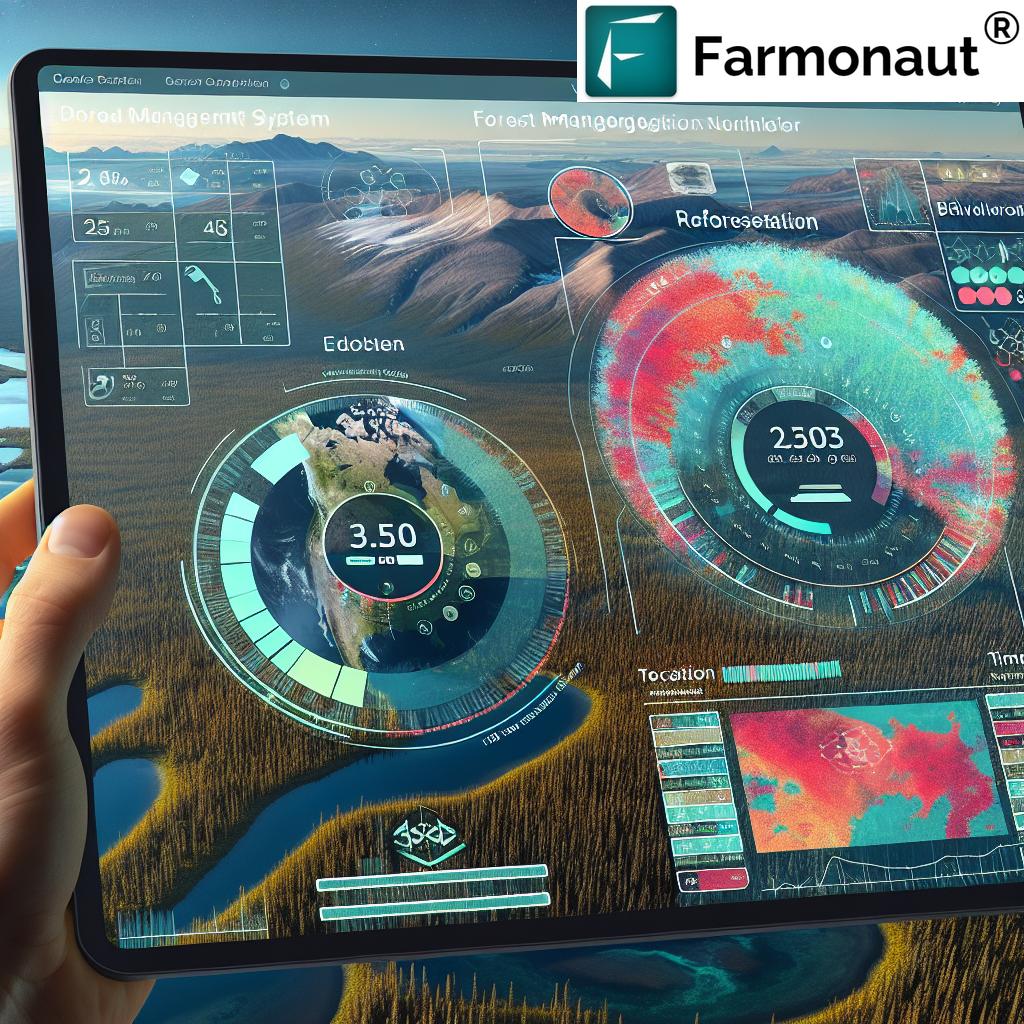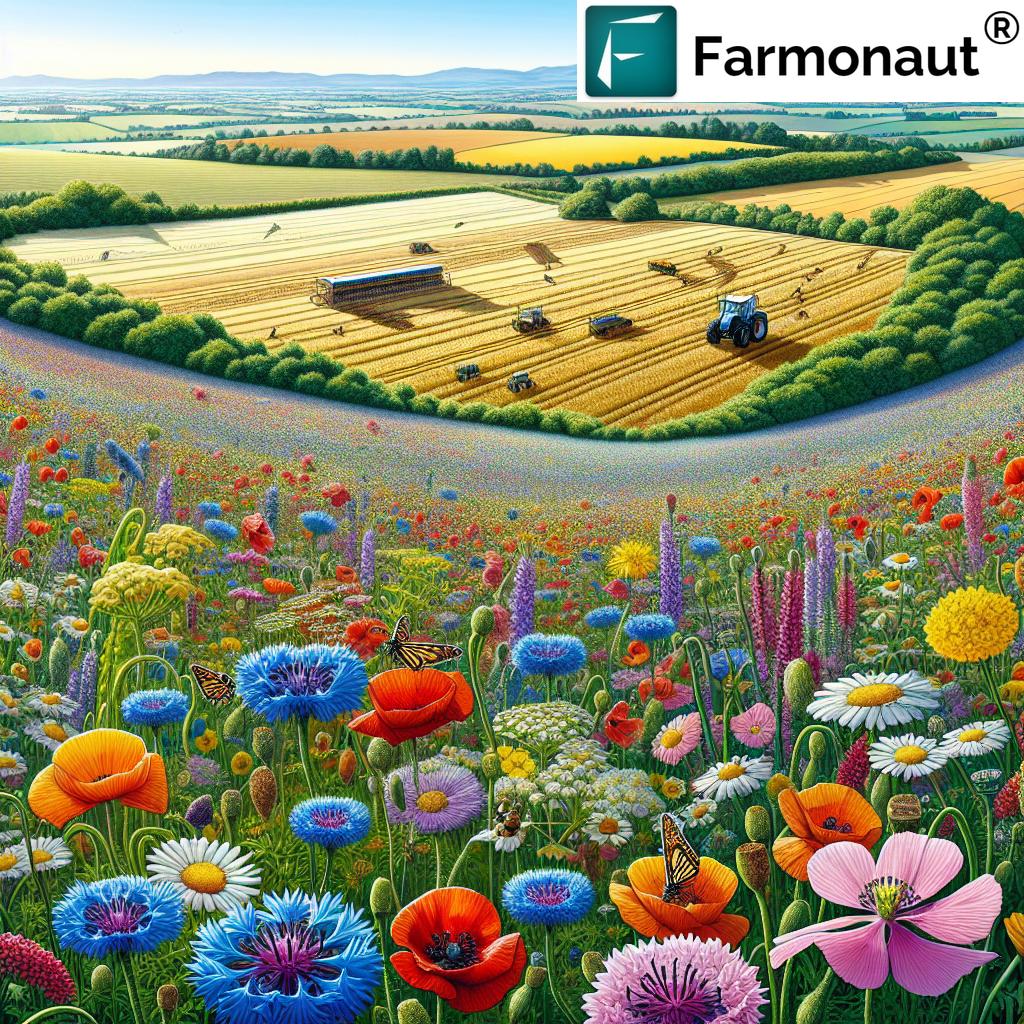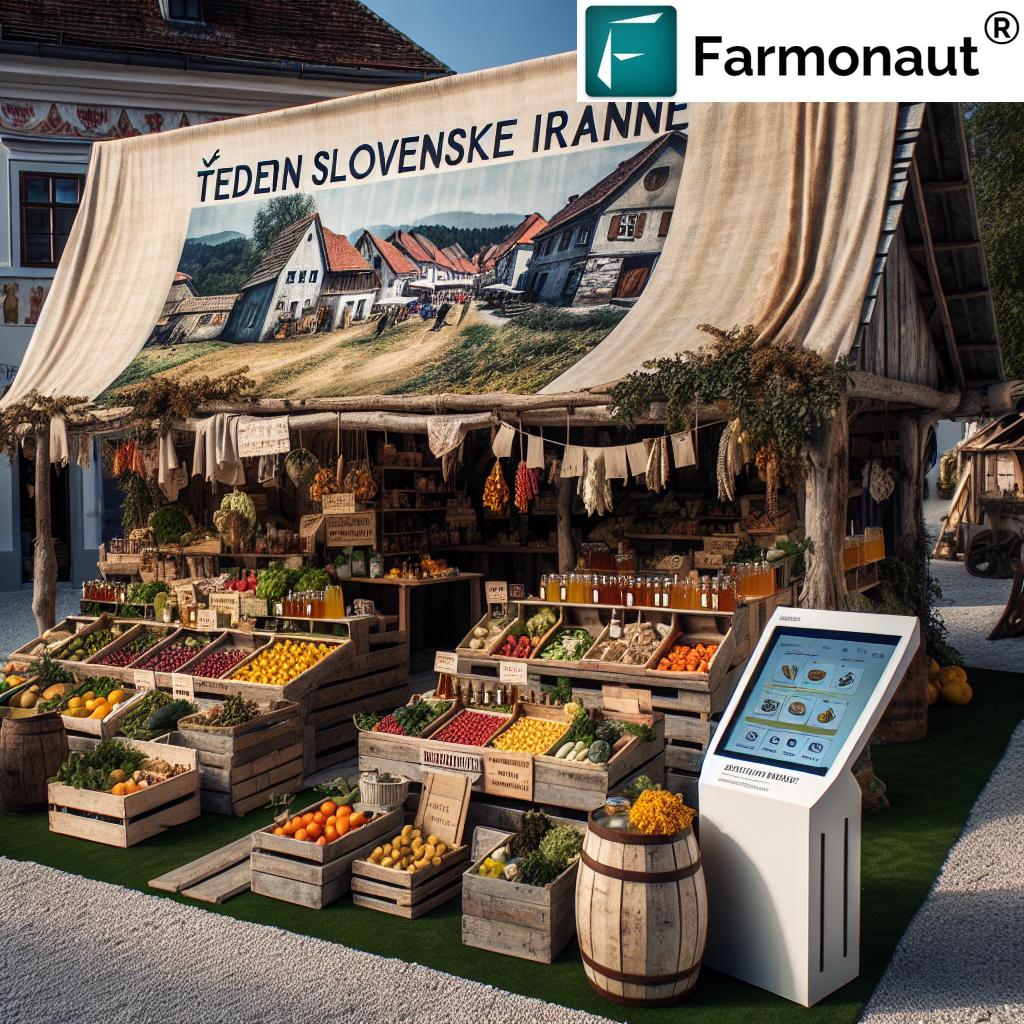Transforming European Agriculture: Sustainable Practices and Cooperative Innovation in Portugal’s Dairy Industry
“European dairy cooperatives manage over 50% of milk production, optimizing agri-food supply chains across regions.”
In the ever-evolving landscape of European agriculture, we are witnessing a remarkable transformation driven by sustainable practices and cooperative innovation. At the forefront of this change is Portugal’s dairy industry, which serves as a microcosm of the broader shifts occurring across the continent. As representatives of Farmonaut, a leading agricultural technology company, we are excited to explore the intricate web of factors shaping the future of farming in Europe, with a particular focus on the dairy sector in Portugal.
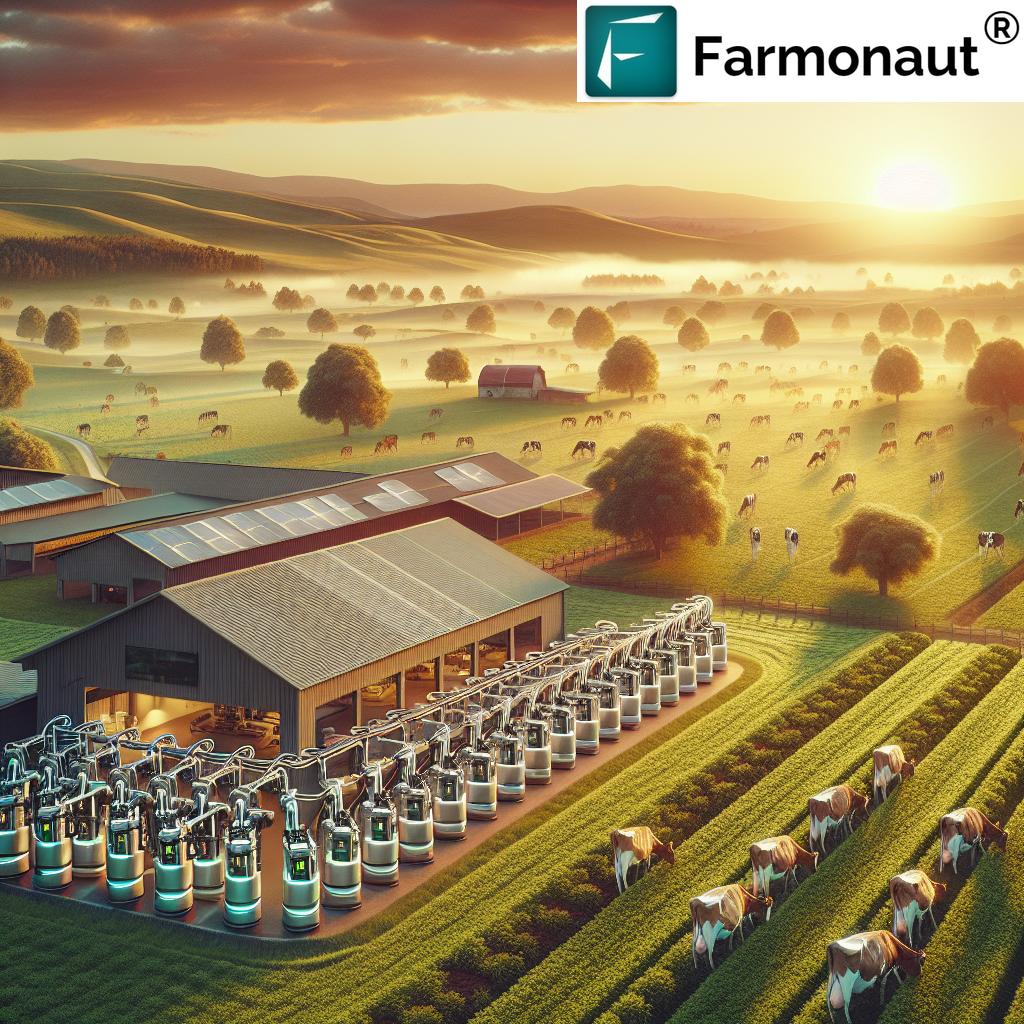
The agricultural sector in Europe is undergoing a profound shift towards sustainability, driven by a combination of policy initiatives, technological advancements, and changing consumer expectations. At the heart of this transformation lies the concept of cooperative farming, which has proven to be a powerful force in driving innovation and ensuring the economic viability of agricultural enterprises.
The Role of Agricultural Policy and the Green Deal
The European Union’s Common Agricultural Policy (CAP) and the ambitious European Green Deal are playing pivotal roles in shaping the future of farming across the continent. These policy frameworks are designed to address critical challenges such as climate change, food security, and rural development while promoting sustainable agricultural practices.
- The CAP focuses on supporting farmers’ incomes, rural development, and environmentally friendly farming practices.
- The Green Deal aims to make Europe climate-neutral by 2050, with agriculture playing a crucial role in this transition.
In Portugal, these policies have catalyzed significant changes in the dairy industry, encouraging farmers to adopt more sustainable practices and invest in innovative technologies. The country’s dairy cooperatives have been at the forefront of implementing these changes, demonstrating the power of collective action in driving industry-wide transformation.
Precision Agriculture Technologies: A Game-Changer for Dairy Farming
The adoption of precision agriculture technologies has been a game-changer for the dairy industry in Portugal and across Europe. These advanced tools and techniques allow farmers to optimize their operations, reduce resource usage, and improve overall productivity.
At Farmonaut, we have witnessed firsthand the impact of precision agriculture on dairy farming. Our satellite-based crop health monitoring system, for instance, has enabled dairy farmers to better manage their fodder crops, ensuring a consistent and high-quality feed supply for their livestock.
Some key precision agriculture technologies transforming the dairy industry include:
- Automated milking systems
- Sensor-based health monitoring for cattle
- GPS-guided machinery for efficient feed crop production
- Smart irrigation systems for pasture management
These technologies not only improve efficiency but also contribute to better animal welfare and environmental sustainability, aligning perfectly with the goals of the EU’s Green Deal.
The Crucial Role of Dairy Cooperative Management
Dairy cooperatives have long been a cornerstone of the European agricultural landscape, and their role in Portugal’s dairy industry is particularly significant. These cooperatives play a crucial role in optimizing agri-food supply chains, supporting producers across regions, and driving innovation in the sector.
Key benefits of dairy cooperative management include:
- Collective bargaining power for better prices
- Shared resources and expertise
- Economies of scale in processing and distribution
- Facilitation of knowledge transfer and best practices
In Portugal, dairy cooperatives have been instrumental in helping small and medium-sized farmers adopt new technologies and sustainable practices. By pooling resources and sharing risks, these cooperatives have enabled farmers to invest in precision agriculture tools and renewable energy solutions that might otherwise be out of reach for individual producers.
Environmental Sustainability: A Top Priority
Environmental sustainability has become a top priority for the European agricultural sector, and the dairy industry is no exception. In Portugal, dairy farmers and cooperatives are implementing a range of initiatives to reduce their environmental footprint and contribute to the EU’s climate goals.
“The EU’s Green Deal aims to reduce agricultural greenhouse gas emissions by 50% by 2050, driving sustainable farming practices.”
Some key sustainability initiatives in the Portuguese dairy industry include:
- Adoption of renewable energy sources, such as solar panels on dairy farms
- Implementation of waste management and recycling programs
- Use of precision feeding techniques to reduce methane emissions from cattle
- Investment in water conservation and treatment technologies
Farmonaut’s carbon footprinting tool has been particularly useful for dairy cooperatives in Portugal, allowing them to track and reduce their environmental impact effectively. By providing real-time data on emissions, we enable businesses to take concrete steps towards sustainability and compliance with environmental regulations.
Renewable Energy Adoption in Agriculture
The adoption of renewable energy sources is a key component of the sustainable agriculture movement in Europe. In Portugal’s dairy industry, we are seeing a growing trend towards the integration of renewable energy solutions, particularly solar and biogas.
Benefits of renewable energy adoption in dairy farming include:
- Reduced operational costs
- Increased energy independence
- Lower carbon footprint
- Potential for additional income through energy sales
Many dairy cooperatives in Portugal are leading the way in renewable energy adoption, installing large-scale solar arrays on their processing facilities and encouraging member farmers to invest in on-farm renewable energy systems. This collective approach to energy transition is helping to accelerate the shift towards a more sustainable dairy industry.
Maintaining High Agricultural Labor Standards
As the European agricultural sector evolves, maintaining high labor standards remains a critical concern. In Portugal’s dairy industry, cooperatives and individual farmers are working to ensure fair working conditions, adequate training, and opportunities for career development.
Key aspects of maintaining high agricultural labor standards include:
- Fair wages and working hours
- Occupational health and safety measures
- Ongoing training and skill development programs
- Promotion of gender equality and inclusion
By prioritizing these aspects, the Portuguese dairy industry is not only improving the lives of agricultural workers but also ensuring the long-term sustainability and attractiveness of the sector to future generations.
Collective Efforts of European Farmers
The transformation of European agriculture is a collective effort involving millions of farmers and their families across the continent. In Portugal’s dairy industry, we see this collective spirit embodied in the cooperative model, where farmers work together to address common challenges and seize new opportunities.
Collective efforts are particularly important in addressing key issues such as:
- Climate change adaptation and mitigation
- Food security and supply chain resilience
- Rural development and community support
- Innovation and technology adoption
Through cooperatives and industry associations, Portuguese dairy farmers are able to share knowledge, pool resources, and advocate for policies that support the sector’s sustainable development. This collaborative approach is proving essential in navigating the complex challenges facing modern agriculture.
Explore Farmonaut’s API for advanced agricultural data
Economic Viability and Changing Consumer Expectations
Ensuring the economic viability of farming operations while meeting changing consumer expectations is a delicate balancing act. In Portugal’s dairy industry, cooperatives are playing a crucial role in helping farmers navigate this challenge.
Key strategies for maintaining economic viability include:
- Diversification of product offerings
- Value-added processing and branding initiatives
- Adoption of cost-saving technologies
- Development of direct-to-consumer marketing channels
At the same time, Portuguese dairy cooperatives are working to meet growing consumer demand for sustainably produced, high-quality dairy products. This involves implementing traceability systems, adopting animal welfare standards, and communicating transparently about farming practices.
Driving Innovation in the Agricultural Sector
Innovation is at the heart of the transformation taking place in European agriculture, and cooperatives are often at the forefront of these efforts. In Portugal’s dairy industry, we see numerous examples of how cooperative structures are driving innovation across various aspects of the value chain.
Areas of innovation in the dairy sector include:
- Product development (e.g., functional dairy products)
- Processing technologies (e.g., advanced filtration systems)
- Packaging solutions (e.g., sustainable and smart packaging)
- Digital technologies (e.g., blockchain for traceability)
Farmonaut’s blockchain-based product traceability solution has been particularly valuable for dairy cooperatives in Portugal, enabling them to provide consumers with detailed information about the origin and journey of their products. This innovation not only enhances consumer trust but also helps cooperatives differentiate their offerings in a competitive market.
Access Farmonaut’s API Developer Docs for integration guidance
From Livestock Production to Forest Land Management
While dairy farming is a crucial component of Portugal’s agricultural sector, it’s important to recognize the interconnectedness of various agricultural activities. Many dairy cooperatives in Portugal are involved in a range of activities beyond milk production, including:
- Feed crop production
- Forest land management
- Agritourism initiatives
- Renewable energy projects
This diversified approach not only provides additional income streams for farmers but also contributes to more sustainable land use practices and rural development. Forest land management, in particular, plays a crucial role in carbon sequestration and biodiversity conservation, aligning with the broader goals of the EU’s Green Deal.
Tackling Key Issues: Climate Change and Food Security
Climate change and food security are two of the most pressing challenges facing the global agricultural sector, and Europe is no exception. In Portugal’s dairy industry, cooperatives are taking a proactive approach to addressing these issues through a combination of adaptive strategies and innovative technologies.
Strategies for tackling climate change in dairy farming include:
- Adoption of heat-tolerant cattle breeds
- Implementation of water-saving irrigation techniques
- Use of climate-smart feed production methods
- Investment in renewable energy and energy efficiency
To enhance food security, Portuguese dairy cooperatives are focusing on:
- Improving milk production efficiency
- Developing drought-resistant feed crops
- Strengthening local and regional supply chains
- Investing in storage and processing infrastructure
Farmonaut’s satellite-based crop health monitoring and AI-driven advisory systems are proving invaluable in these efforts, helping farmers make data-driven decisions to optimize their operations in the face of changing climatic conditions.
The Future of European Agriculture: A Collaborative Approach
As we look to the future of European agriculture, it’s clear that collaboration and innovation will be key to addressing the sector’s challenges and seizing new opportunities. The experience of Portugal’s dairy industry demonstrates the power of cooperative models in driving sustainable transformation and ensuring the long-term viability of farming communities.
Key elements of this collaborative approach include:
- Knowledge sharing and best practice exchange
- Joint investment in research and development
- Collective marketing and branding initiatives
- Coordinated policy advocacy at national and EU levels
By working together, European farmers and agricultural cooperatives can navigate the complex landscape of environmental regulations, changing consumer preferences, and technological advancements. This collaborative spirit, combined with innovative technologies like those offered by Farmonaut, will be crucial in building a resilient, sustainable, and prosperous agricultural sector for future generations.
European Agricultural Sustainability Metrics
| Country | Cooperative Participation Rate (%) | Renewable Energy Adoption in Agriculture (%) | Precision Agriculture Technology Usage (%) | Agricultural Labor Standards Index (1-10) | Carbon Footprint Reduction since 2015 (%) |
|---|---|---|---|---|---|
| Portugal | 65 | 35 | 45 | 8 | 20 |
| France | 70 | 40 | 55 | 9 | 25 |
| Germany | 60 | 50 | 60 | 9 | 30 |
| Netherlands | 80 | 45 | 70 | 9 | 35 |
| Denmark | 85 | 55 | 75 | 10 | 40 |
This table provides a comparative overview of key sustainability indicators across different European countries, with a focus on the agricultural sector. It illustrates the progress made in areas such as cooperative participation, renewable energy adoption, precision agriculture usage, labor standards, and carbon footprint reduction. Portugal’s metrics show strong performance in cooperative participation and labor standards, with room for growth in renewable energy adoption and precision agriculture usage compared to some of its European counterparts.
Conclusion: A Sustainable Future for European Agriculture
The transformation of European agriculture, as exemplified by Portugal’s dairy industry, is a testament to the power of sustainable practices, cooperative innovation, and technological advancement. By embracing precision agriculture technologies, renewable energy solutions, and collaborative approaches to problem-solving, European farmers are paving the way for a more resilient and environmentally friendly agricultural sector.
As we move forward, the continued success of this transformation will depend on:
- Ongoing investment in research and innovation
- Supportive policy frameworks at national and EU levels
- Strong partnerships between farmers, cooperatives, and technology providers
- Consumer education and engagement on sustainable food systems
At Farmonaut, we are committed to supporting this transformation by providing cutting-edge agricultural technology solutions that empower farmers and cooperatives to make data-driven decisions and optimize their operations. Together, we can build a sustainable and prosperous future for European agriculture.
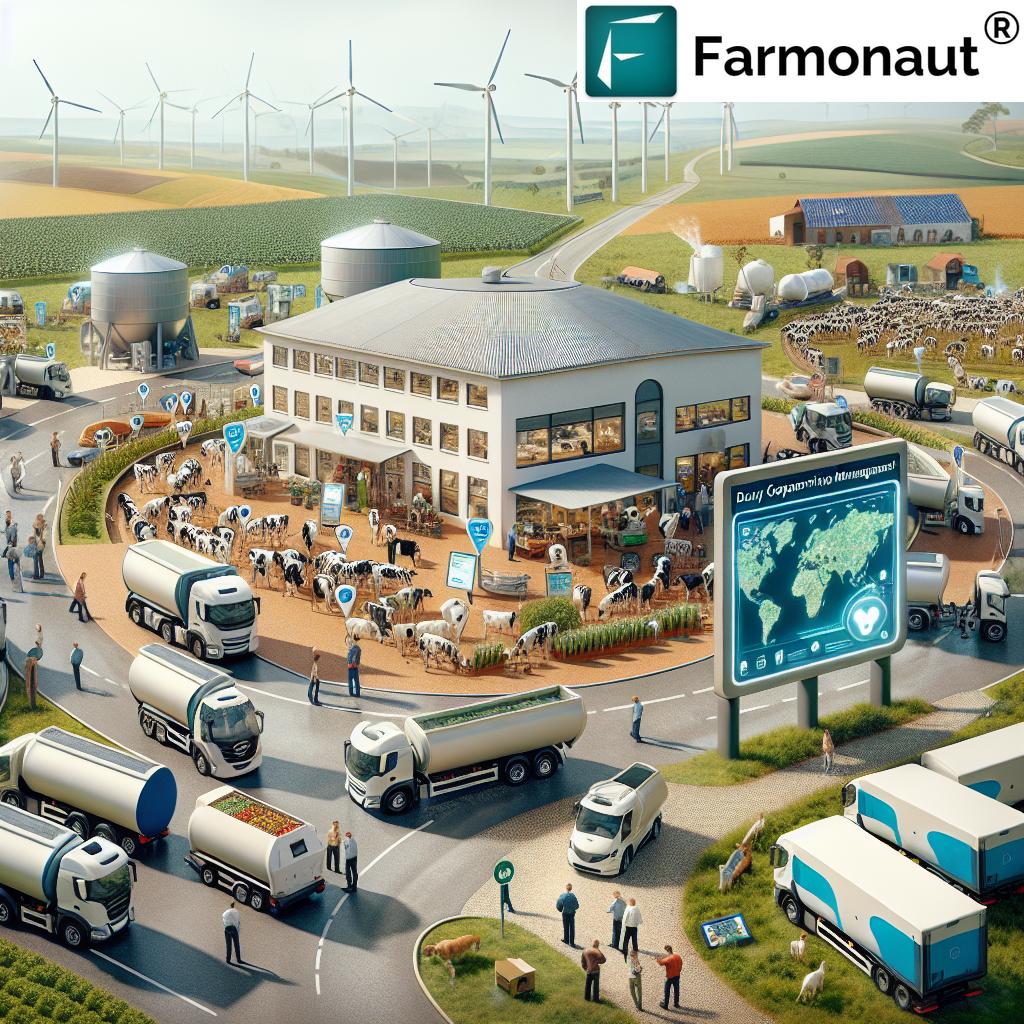
FAQ Section
Q: What role do cooperatives play in Portugal’s dairy industry?
A: Cooperatives play a crucial role in Portugal’s dairy industry by optimizing agri-food supply chains, supporting producers across regions, driving innovation, and helping farmers adopt new technologies and sustainable practices.
Q: How is precision agriculture transforming dairy farming in Europe?
A: Precision agriculture technologies such as automated milking systems, sensor-based health monitoring for cattle, GPS-guided machinery, and smart irrigation systems are improving efficiency, animal welfare, and environmental sustainability in dairy farming.
Q: What are some key initiatives for environmental sustainability in the Portuguese dairy industry?
A: Key initiatives include adopting renewable energy sources, implementing waste management programs, using precision feeding techniques to reduce methane emissions, and investing in water conservation technologies.
Q: How are European agricultural policies influencing sustainable practices?
A: The EU’s Common Agricultural Policy (CAP) and the European Green Deal are driving sustainable practices by supporting environmentally friendly farming, promoting rural development, and setting ambitious climate neutrality goals.
Q: What challenges does the European dairy industry face in terms of economic viability?
A: The industry faces challenges in balancing economic viability with changing consumer expectations, adapting to climate change, and implementing new technologies while maintaining high labor standards.





